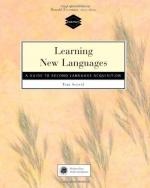|
This section contains 3,130 words (approx. 11 pages at 300 words per page) |

|
Human language is a remarkable symbolic means of communication that makes it possible for individuals to convey their thoughts and feelings to others. Although babies are born completely without language, by the time they are three or four years old, children have acquired thousands of vocabulary words, complex grammatical and sound systems, and the ability to speak appropriately in many different social situations. Although societies around the world differ in many ways, language is a universal phenomenon, and children around the world acquire their native language in very similar ways.
The Structure of Language
All human languages include a number of systematic features that the young learner must master. Languages are organized hierarchically and include a number of subsystems. The systems of language include phonology, morphology, the lexicon and semantics, syntax, pragmatics, and discourse. Children begin to acquire some aspects of their language during their first...
|
This section contains 3,130 words (approx. 11 pages at 300 words per page) |

|


